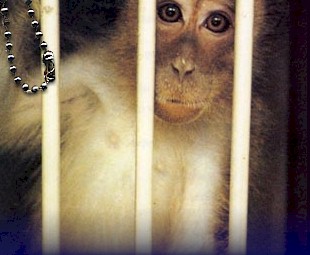






|
||||||||||||||||||||||||||||||||||||||||||||||||||||||||||||||||||||||||||||||||||||||||||||||||||||||||||||||||||||||||||||||||||||||||||||||||||||||||||||||||||||||||||||||||||||||||||||||||||||||||||||||||||||||||||||||||||||||||||||||||||||||||||||||||||||||||||||||||||||||||||||||||||||||||||||||||||||||||||||||||||||||||||||||||||||||||||||||||||||||||||
The good life denied to cj0506
from the files of the Wisconsin Regional Primate Research
Center (WNPRC) In the summer of 2009 I wrote to the University of Wisconsin in order to learn more about a Common Marmoset (Callithrix jacchus) identified only by a number, cj0506. Several months later I received documents from the University of Wisconsin. I was quite disappointed with the amount of information they choose to disclose to me. In their letter they state that laboratory reports are withheld due to a Wisconsin statute. The records I received state the medications that have been administered, and the names of studies she has been subjected to, but not much more than that. The last thing that was documented about cj0506 was that she was destined for transfer to the University of Utah. I can’t help but imagine what life would have been like for cj0506 had she been born in the wild. Cj0506 would have been cared for by her entire family. As an
infant she would have spent the majority of her time clinging
to the backs of her father and older siblings as they fed in the
forest canopy. Before long she would be running and leaping on
her own. Much of her time as a youngster would have been spent
engaging in play behaviors such as chasing and wrestling with
her siblings. Foraging would have included hunting insects, as
well as eating gum and sap from trees. As an adult she would have
helped her parents with child rearing duties, and eventually she
would have started a family of her own. I find it heartbreaking
that she was never able to fulfill her life as a marmoset should.
Her life began in a breeding facility somewhere where she was
stolen from her mother. Her life before WNPRC is unknown; it is
very likely that she was subjected to research studies at other
institutions prior to arriving at the WNPRC. She was subjected
to several studies at WNPRC. Her life there resembled nothing
of what it would have and should have been in the wild. Captive marmosets bred for research do not know the pleasure
of hunting for insects or eating gum in the forest canopy. Marmosets
bred for research are subjected to numerous experiments, everything
from drug addiction studies to Parkinson’s disease research.
The cages that marmosets are kept in are small and cramped. Aggressive
interactions between neighboring individuals are common in captivity
due to the territorial nature of marmosets. This is evident in
the records I received; evidently cj0506 had been treated for
bite wounds to her ears and wrists and scratches to her face.
Aggressive interactions often lead to chronic fear and stress.
The experimental studies she has been subjected to such as, Mechanisms
of Psychosocial Suppression of Cortisol and Absence of Estrogen-depletion
Bone Loss in Marmosets, are unlikely to be of any use to humans.
Even if these studies were beneficial to humans, they would be
inappropriate and unethical. Like all primates, marmosets are
curious, sensitive, and intelligent creatures. Marmosets should
never be kept in captivity; they should be left alone to pursue
their lives in the wild. Thanks to Mike for having the courage and tenacity to obtain cj0506's records and for being her voice.
Mike; a true friend to primates.
Speak out. Your silence signals your acceptance.
Home Page | Our Mission | News |